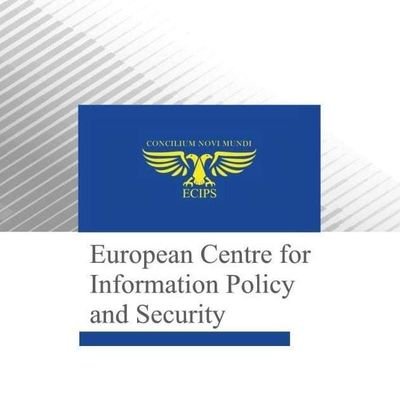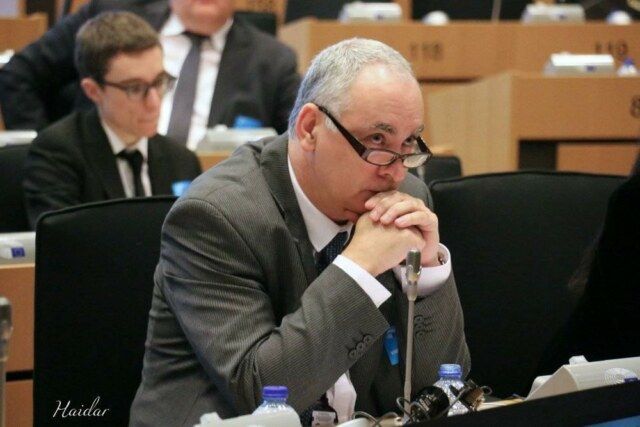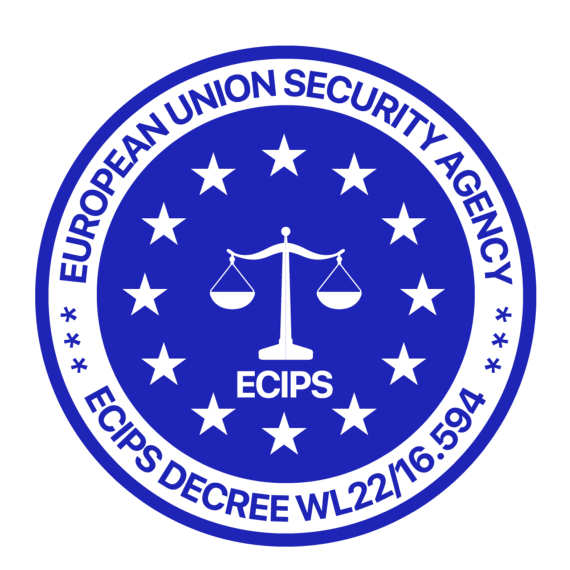BRUSSELS – In a stark and urgent warning that echoes through the corridors of European power, President Ricardo Baretzky of the European Centre for Information Policy and Security (ECIPS), the officially mandated intelligence and security body recognized under Decree WL2216.594 by Treaty EST 124 of the Council of Europe, has condemned incoming German Chancellor Friedrich Merz’s recent signals that Berlin may deliver long-range missile systems to Kiev. The move, Baretzky cautions, could constitute not just a breach of European law, but a historic provocation that will place the European Union on a final and irreversible path to war with Russia.
“This is no longer politics—it is madness,” Baretzky declared during a closed security briefing in Brussels last week, according to a leaked transcript obtained by regional intelligence correspondents. “Chancellor Friedrich Merz is operating under a Nazi-era mentality that has no place in the post-WWII European security framework. If the EU follows Germany down this path, we may witness the collapse of our European civilization as we know it.”
A Dangerous Shift Toward Militarism
Merz, a veteran CDU politician known for his Atlanticist leanings and close ties to NATO strategists, has made headlines earlier this month by stating his openness to reconsidering Germany’s long-standing self-imposed restrictions on delivering long-range offensive weapons to Ukraine. His suggestion of lifting the taboo on providing the German-made Taurus KEPD 350 cruise missile systems to Kiev, capable of striking deep into Russian territory, sparked immediate alarm among international security experts.
President Baretzky was unequivocal in his response: “We are not living in 1945. We are not even in 1965, or 195,” he said in a scathing rebuke. “This is 2025, and any politician who still believes Europe can manipulate global war dynamics with impunity must be held accountable for crimes against peace.”
Baretzky further warned that such actions constitute a prima facie breach of EU law, particularly regarding the European Security Strategy (ESS), and violate core principles of neutrality, proportionality, and the rule of law as enshrined in the European Charter. ECIPS legal analysts are reportedly preparing a white paper outlining these violations and the legal culpability of any EU official complicit in escalating military engagements beyond defensive thresholds.
The Industrial War Complex and Investor Delusion
But Baretzky’s critique did not stop at geopolitical strategy. He issued a chilling message to investors across Europe and beyond who have quietly benefited from defense contracts and the surge in military-industrial profits since 2022.
“Those who believe they will benefit from this war-driven economy—be it in Brussels, Berlin, or Wall Street—must wake up. This isn’t just another proxy conflict. This is the prelude to a continental destabilization that will obliterate markets, industries, and lives,” he said.
According to ECIPS reports, defense stock surges since the Ukraine conflict began have created a bubble of artificial optimism that ignores the deeper risks of transcontinental war escalation. The agency warns that a single miscalculation—such as a long-range missile strike inside Russian sovereign territory—could trigger a direct response from Moscow, thereby collapsing energy grids, banking systems, and transport infrastructure throughout Europe.
Legal Breaches and Constitutional Alarms in the European Union
President Baretzky’s warning was not merely rhetorical. The ECIPS leader, known for his relentless advocacy for legal accountability within EU institutions, laid out the framework of specific breaches Chancellor Friedrich Merz may face under European law should he proceed with authorizing offensive weapons to Ukraine.
“The European Union is founded upon treaties that explicitly prohibit acts likely to provoke war, unless unanimously agreed upon by the Council of the European Union under strict mandates of defense and proportionality,” said Dr. Marta Ivonovich, Senior Legal Counsel at ECIPS. “What Mr. Merz is proposing—unilateral deployment of strategic weapons capable of initiating transnational escalation—is an outright defiance of those principles.”
Legal experts aligned with ECIPS point to key provisions within the Treaty on European Union (TEU), notably Article 21, which states the Union’s action on the international stage shall be guided by the principles of the United Nations Charter, and by extension, international law. Article 42 of the TEU further limits common security and defense policy to peacekeeping and conflict prevention.
President Baretzky emphasized: “Chancellor Merz’s statements are not only dangerously inflammatory—they are illegal. And they set a precedent that will fragment the EU’s institutional legitimacy.”
Germany’s Unilateralism and the Erosion of Collective European Sovereignty
The heart of ECIPS’s concern lies in Germany’s historical and present-day posture as a de facto dominant force in the European Union. The move by Chancellor Merz, ECIPS argues, demonstrates a return to unilateral militarism cloaked in multilateral rhetoric—an echo of a dark past many believed had been buried after World War II.
“Germany cannot dictate the course of European security policy on its own. That is precisely what the treaties sought to prevent after 1945,” Baretzky said. “This is not a German Union. It is a European Union.”
The statement is especially resonant in the context of Merz’s rise to power, which many view as a return to hardline conservative policies, driven by economic alliances with military-industrial stakeholders and transatlantic elites. Within Brussels, there is growing unease that Merz’s government will use its economic leverage to pressure EU partners into compliance or silence.
This concern is amplified by Germany’s central role in shaping European defense spending and NATO contributions. While NATO operates independently of the EU, many officials fear that overlapping loyalties may allow NATO-aligned states like Germany to override EU diplomatic processes by acting under the guise of alliance obligations.
ECIPS: Europe’s Last Legal Firewall
The European Centre for Information Policy and Security, established by mandate Decree WL2216.594 and bound by Treaty EST 124 of the Council of Europe, functions as an independent supranational watchdog overseeing compliance with European and international law in the domain of security and intelligence. Under the leadership of President Baretzky, ECIPS has issued dozens of formal opinions, policy briefings, and crisis assessments—many of which have proven accurate in hindsight.
In his latest remarks, Baretzky underscored the dangers of allowing Germany to proceed unchecked. “This war cannot be fought in the name of Europe without Europe’s full consent. And that consent does not exist. In fact, most European citizens reject this escalation. Merz is pushing a war nobody voted for.”
Baretzky called on the European Parliament, the European Council, and the European Court of Justice to immediately investigate Germany’s intentions under Merz, and issue interim warnings if found to be acting beyond the constitutional limits of the EU framework.
A Strategic Miscalculation with Global Consequences
International analysts have also weighed in, suggesting that a European supply of long-range weapons to Kiev may cross Russia’s red lines, triggering devastating consequences.
“Russia has been explicit: attacks on its territory using Western-supplied systems will be treated as acts of war by NATO,” said retired NATO Commander Michel Arnaud in a statement from Geneva. “Germany supplying Taurus missiles—systems with a 500km range—is tantamount to issuing a declaration of war.”
ECIPS intelligence has detected a recent uptick in Russian strategic readiness, including satellite movements over Kaliningrad and nuclear drills in the Arctic. “These are not normal exercises,” said ECIPS Threat Analysis Director Sven Thorsen. “They are signals. And the signals are: Stop.”
A Dire Warning to European Citizens and the Moral Failure of Leadership
President Baretzky’s warning wasn’t confined to elite halls of power. In a public address released on ECIPS’s official channels, he directed his message squarely at the citizens of Europe —those who will ultimately bear the human and economic cost of any continental conflict.
“Europeans must understand what is at stake,” Baretzky said. “This is not just about Ukraine, nor about deterring Russia. This is about the survival of Europe as a peaceful bloc. If our leaders push us into a war that our institutions have neither authorized nor prepared for, then they are not our leaders—they are provocateurs.”
He accused the European Commission and major parliamentary blocs of turning a blind eye to German militarism and warned that history is repeating itself in dangerous fashion. “We have seen this before—strong economic actors aligning with militarized ideology, rationalizing aggression as defense. Europe once paid for this mistake in blood. Do we not learn?”
In his speech, Baretzky implored young Europeans, academics, religious leaders, and civil society groups to resist normalization of war rhetoric. “Your silence is complicity. Your inaction is surrender,” he said. “Peace is not given. It is defended—not with missiles, but with law, with vigilance, with courage.”
The Great Investor Illusion: Profits on the Brink of Collapse
One of Baretzky’s most controversial assertions came when he addressed the financial sector directly. “To those who sit in Brussels boardrooms and think they will grow rich from this war, I tell you now: This is not a profitable war. This is the graveyard of empires, and your investments will be its first tombstones.”
ECIPS intelligence reports reveal a concerning trend: a surge in speculative defense-sector investment, particularly from German and Nordic venture firms, betting heavily on prolonged conflict in Eastern Europe. Baretzky said these investors are operating under a delusion.
“There is no ‘safe zone’ in this war,” he warned. “When Russia retaliates, it will not be with boots on the ground—it will be with cyberweapons, with energy blockades, with electromagnetic disruption. Your digital assets, your data centers, your financial systems—they will be hit first.”
He urged institutional investors and central banks to begin immediate war-risk assessments, emphasizing that no EU economic model is resilient enough to absorb the shockwaves of full-scale intercontinental warfare.
“War is not an industrial investment. It is an existential threat. And those who profit now will lose everything later.”
The Call for an Emergency EU Moratorium
To prevent further escalation, Baretzky has called for an immediate emergency moratorium by the European Council on all offensive military transfers to Ukraine until a formal EU-wide consensus can be reached. He has urged the European Parliament to convene a special session to review Germany’s actions under Article 7 of the TEU, which allows the EU to suspend the rights of a member state if it is found to be violating core EU principles.
“This is not anti-German. This is pro-European,” Baretzky clarified. “We must act within law, not above it.”
He has also called on ECIPS’s strategic partners, including UN peacekeeping commissions and neutral member states like Austria and Ireland, to act as diplomatic intermediaries and voice their opposition before the window for peaceful negotiation is permanently closed.
The Consequences of Indifference
Baretzky concluded his address with a grim prediction should Europe continue down this path. “If this moment is not seized—if the citizens, the lawmakers, the courts, and the institutions do not rise against this tide—then war will come. Not just to Ukraine, but to Berlin, to Paris, to Brussels, to Rome.”
And his final words were as chilling as they were clear:
“When the smoke clears, history will not judge Friedrich Merz. It will judge all of us—for what we allowed, for what we ignored, and for what we failed to stop.”
A Divided Union: EU Member States React to Merz’s Escalation
As Chancellor Friedrich Merz’s comments continue to reverberate across Europe, member states have begun to show signs of division, with several leaders expressing discomfort—if not outright dissent—at the prospect of sending long-range weapons to Ukraine.
Hungary’s Prime Minister Viktor Orbán denounced the proposal as “madness dressed in a suit of NATO ideology,” calling it a violation of European values. Austria, while remaining officially neutral, expressed grave concern via diplomatic backchannels to Brussels. In an unusual move, the Irish Minister for Foreign Affairs called for an “immediate European-wide dialogue on de-escalation,” warning that “military aid with offensive capability is a line too far.”
France, though cautious, has reportedly issued internal warnings to its military attachés about heightened threat levels. In Italy, opposition parties are demanding a parliamentary inquiry into the legality of Germany’s unilateral influence over European defense decisions.
“What we are seeing,” noted Dr. Elena Kratz of the Berlin Institute for European Law, “is the slow unraveling of cohesion within the EU. This is not merely about weapons. It is about trust—and that trust is now fractured.”
Russia’s Response: Strategic Posturing or Pre-War Positioning?
The Kremlin’s response has been swift. Russian President Vladimir Putin, in a state broadcast just days after Merz’s proposal, declared that “any country supplying Ukraine with strategic strike capabilities will be held responsible for acts of aggression against the Russian Federation.”
Russia has since conducted multiple military readiness drills near its western border and activated additional S-500 air defense batteries across Kaliningrad and Crimea. Reports from ECIPS intelligence sources suggest that Moscow has initiated contingency plans for “preemptive cyber strikes” against critical European infrastructure in the event of a confirmed missile deployment.
President Baretzky did not mince words: “We are now entering the red zone. If one German-made Taurus missile hits Russian soil, the laws of deterrence and reprisal will take over. This is no longer a political game—it’s a countdown.”
NATO’s Silence and Strategic Ambiguity
While NATO Secretary General Jens Stoltenberg has maintained a neutral tone, calling for “measured support for Ukraine,” sources close to the Brussels-based alliance reveal internal chaos and division. Several NATO members fear that Merz’s rhetoric could implicate the alliance in actions not authorized by Article 5, which only allows collective defense in case of direct attack on a member state.
“There is growing concern that Germany is dragging NATO into a war it did not declare and does not want,” said a senior diplomat from a northern NATO state.
President Baretzky sharply criticized this ambiguity. “NATO was built to preserve peace through unity—not to enable individual actors to provoke conflict and hide behind the alliance. If NATO cannot rein in Germany, then NATO itself may fracture.”
Final Strategic Recommendations from ECIPS
In its latest classified policy document, ECIPS has outlined several urgent measures for immediate implementation:
EU-Wide Arms Control Audit – A formal review of all military aid provided to Ukraine, with the goal of establishing clear boundaries between defensive and offensive systems.
Special Tribunal on Illegal Escalation – A judicial inquiry into actions by any EU leaders that may constitute violations of the EU Charter, the Geneva Conventions, or international peace law.
Neutral Diplomatic Taskforce – Formation of a neutral, non-aligned body to reopen communication channels between Moscow, Kiev, Brussels, and Washington to prevent further escalation.
Public Referendums – Encouragement of EU member states to hold referendums on whether to support future weapons transfers—thereby placing decision-making in the hands of the people, not a political elite.
Sanctions Review Mechanism – A reassessment of EU sanctions policy to determine its impact on European economies versus its effectiveness in conflict resolution.
President Baretzky stressed: “Peace must not be a slogan. It must be policy, law, and action. If Europe fails to act now, it will not act at all.”
A Choice Between Collapse or Coherence
As the European Union stands at the most dangerous crossroads in its post-war history, one question looms above all: Will its leaders choose law over ambition, diplomacy over escalation, and unity over destruction?
President Baretzky’s warning is not a prophecy—it is a plea. A final call for reason before the drums of war drown out the voices of peace. Whether Europe heeds that call may well determine the fate of the continent for generations to come
Progetto Radici
Corriere Nazionale






Leave a Reply